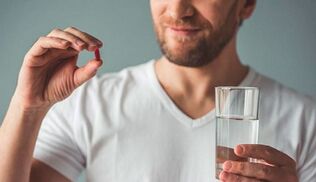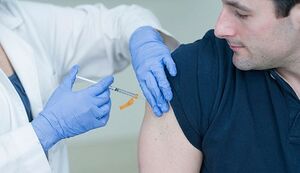
Treatment of prostatitis in men with drugs is carried out using various drugs. The doctor can prescribe to the patient: suppositories, tablets, injections and strengthen the therapy with vitamins. Inflammation of the prostate gland has a different classification, for this reason, the selection of medicines should be carried out by a doctor. The doctor will be able to classify the disease and choose an adequate therapy.
Indications for the use of drugs
How to cure prostatitis and what needs to be done for this? To get rid of inflammation of the prostate gland, stop the development of the disease and avoid complications, it is necessary to classify it, and only then proceed to treatment.
There are several types of prostatitis, they are classified by reason. In this case, the therapy of various forms of the disease has its own differences and characteristics.
Classification and Therapy:
- Treatment of acute prostatitis takes place, as a rule, on an outpatient basis, it includes antibiotic therapy (antibiotics) and anti-inflammatory drugs. If the patient has pronounced signs of intoxication, then diuretics are also prescribed.
- Chronic non-bacterial type of prostatitis: use complex therapy, this form of the disease is treated with antibiotics, alpha-blockers (reduce the intensity of symptoms), herbal preparations, anti-inflammatory drugs.
- Treatment of chronic prostatitis in men includes the following medications: antibiotics, alpha blockers, they help to reduce organ swelling, anti-inflammatory drugs, immunostimulants.
- Asymptomatic chronic prostatitis - no treatment as such. Prescribe medications that improve the functioning of the genitourinary system. This type of disease is dangerous in that it has a certain similarity (in clinical signs) with prostate cancer.
When a man's prostate gland becomes inflamed, specific symptoms develop. Together with the results of analyzes and studies, these signs help the doctor to make the correct diagnosis to the patient.
Types and forms of drugs for prostatitis
Prostatitis can be cured with various medications, but complex therapy is most effective. This method of treatment includes the following medicines:

- antibiotics (antibacterial agents that contribute to the death of pathogenic microflora);
- alpha-blockers (reduce the severity of unpleasant symptoms);
- bioregulatory peptides (products based on the prostate gland of cattle);
- hormonal drugs (stop the inflammatory process in the tissues);
- muscle relaxants (reduce tension in the muscles of the perineum);
- NSAIDs (non-steroidal anti-inflammatory drugs);
- antispasmodics (used only if the patient suffers from a pronounced pain syndrome);
- phytotherapeutic agents (have a diuretic and mild anti-inflammatory effect);
- vitamins (strengthen the immune system, activate the body's natural protective functions).
Antibiotics for the treatment of prostatitis
Medical treatment of prostatitis cannot be imagined without the use of antibiotics. As antibiotic therapy, the patient may be prescribed certain drugs, which will be prescribed by a specialist.
But pills for prostatitis are not only antibiotics, but also other medicines that have a different effect on the human body.
Supplement to antibiotic therapy
The treatment regimen for prostate inflammation has its own characteristics. While antibiotic therapy is essential, the use of other agents is perceived by patients as an adjunct to treatment.
Drugs for the treatment of prostatitis:
- NSAIDs- in case of an inflammatory process in the tissues of the prostate gland. The course of treatment with these drugs can be long-term (up to 10-14 days), depending on the severity of the symptoms.
- Hormones. But doctors have special prejudices about hormones. The effectiveness of these medications is questioned because it lasts as long as the patient is taking hormones. The main condition for the appointment is the ineffectiveness of traditional therapy using antibiotics and NSAIDs.
- Alpha-blockers- relax the muscles of the urethra and act on the sphincter of the urinary bladder in the same way. Thus, reducing the intensity of the severity of symptoms.
- Antispasmodics- the main reason for the appointment is severe pain. The most common cause of pain is spasm, so patients are prescribed these drugs.
- Muscle relaxants- they act in a relaxing way on the muscles of the perineum. With prostatitis, they help to reduce unpleasant symptoms. An antibiotic supplement is prescribed.
- Bioregulatory peptidesare medicines made from the prostate gland of cattle. They act as immunostimulants, activate the natural protective functions of the body.
- Phytotherapeutic preparations- this concept includes decoctions and herbal infusions, extracts of useful plants. As well as products made from natural ingredients.

Vitamins
In most cases, preference is given to complexes aimed at stimulating the activity of the human immune system. Also, the doctor may recommend taking medications for men.
You can choose any other complex of vitamins, urologists often attribute those medicines that they work with and in the effectiveness of which, they have no doubts.
Medicines for the treatment of prostatitis in men
There are several groups of medicines that are consistently prescribed in the treatment of prostate inflammation. The differences affect not only the properties of drugs, but also the form of their release.
The urologist may prescribe to the patient:
- Suppositories for prostatitis- or rectal suppositories, are inserted directly into the rectum. The course of treatment varies from 5 to 10 days.
- Instillationsis a procedure in which antibacterial solutions are injected directly into the urethra in order to deliver them to the tissues of the inflamed prostate gland. The procedures are carried out in a hospital setting to increase the effectiveness of therapy.
- Intravenous or intramuscular injections- injections are prescribed if it is required to normalize the patient's condition as soon as possible.
- Tabletsare antibacterial, anti-inflammatory and even hormonal drugs intended for oral administration. Tablets form the basis of therapy, or complement it.
- Microclysters- such procedures are not performed in a hospital. But within the framework of outpatient treatment, the patient, if desired, can resort to such procedures. The basis for microclysters is a decoction of herbs and useful plants. A kind of folk method of treating the disease.

Medicines for prostatitis are inexpensive and effective
Faced with inflammation of the prostate gland, you can get rid of it without much material costs. Home treatment without hospitalization should also be supervised by a urologist. But in order to cope with the disease, familiar and cheap drugs prescribed by a doctor are used.
Useful herbal decoctions will also help strengthen the selected therapy, they will replace expensive medicines made from herbal and plant extracts.
Combined prostatitis treatment is effective. If the drugs are combined correctly, the patient will feel the effect of their intake after a short period of time. For this reason, such therapy is carried out with suspicion of prostatitis and the presence of specific symptoms.






























